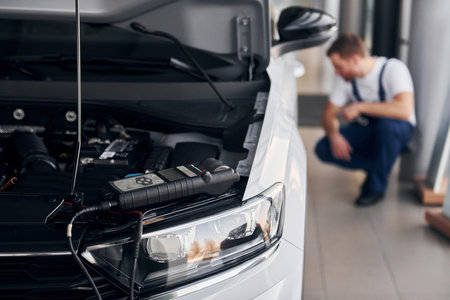Understanding UK Conditions and Battery Lifespan
The unique tapestry of the British climate—with its famously unpredictable weather, damp winters, and mild summers—creates a distinct environment for motorists and their vehicles. Unlike the extremes of continental Europe or the arid roads of southern regions, the UK’s frequent rainfall and fluctuating temperatures put car batteries under particular strain. For British drivers, this means understanding how these environmental factors influence battery longevity is essential to avoiding unexpected breakdowns. The persistent moisture can lead to terminal corrosion, while short, stop-start journeys—common in urban areas from London to Manchester—prevent batteries from fully recharging. Coupled with the increasing prevalence of electronic systems in modern vehicles, these conditions can accelerate battery wear and heighten the risk of failure. Recognising these uniquely British challenges is the first step toward proactive maintenance and ensuring your motor remains as reliable as Big Ben’s chimes.
2. Recognising Signs of Battery Trouble
In the ever-changing British climate, a car batterys health can be tested by everything from frosty mornings to damp, rainy afternoons. For motorists across the UK, being attuned to the early warning signs of battery trouble is vital for avoiding roadside mishaps and ensuring uninterrupted journeys—whether you’re on the school run in Surrey or heading for a weekend escape to the Lake District.
Subtle Symptoms Not to Ignore
While some battery failures are sudden, most offer subtle clues before letting you down. British drivers should keep an eye (and ear) out for these tell-tale signs:
| Symptom | What You Might Notice |
|---|---|
| Sluggish Engine Starts | The engine takes longer than usual to turn over, especially on cold mornings. |
| Dashboard Warnings | Battery or engine warning lights appear unexpectedly on your dashboard. |
| Dim Headlights & Interior Lights | Lights seem less bright than normal, particularly when idling at traffic lights. |
| Electrical Issues | Windows roll up slowly, radio cuts out, or other electronics behave unpredictably. |
| Clicking Sound When Starting | You hear a clicking noise rather than the usual engine start-up sound. |
The British Driving Experience: A Unique Challenge
The frequent stop-start nature of city driving in places like London and Manchester can put additional strain on your battery. Likewise, short trips don’t allow your alternator enough time to recharge the battery fully—a common situation for urban commuters. Add to this the impact of damp weather, which can accelerate corrosion on terminals and connections.
Why Early Detection Matters
Catching these symptoms early allows for timely maintenance or replacement, sparing you the inconvenience of a breakdown—especially when caught out in typical British drizzle. By recognising these signs and acting promptly, you not only protect your vehicle but uphold the proud tradition of British motoring reliability.

3. Routine Battery Health Checks
For British motorists, the unpredictable weather and stop-start nature of UK driving make regular battery health checks not just a best practice, but an essential ritual. Ensuring your vehicle’s battery is in top condition can be the difference between a seamless journey and an untimely roadside breakdown. But what exactly should you look for, and how often should you check?
What to Look For During Inspections
Begin by inspecting for any signs of corrosion around the battery terminals—a common culprit for poor connections in Britain’s damp climate. Ensure the cables are tightly secured and free from fraying or cracking. Take note of any swelling or leaks on the battery casing, as these are clear indicators that attention is required. If your car struggles to start on chilly mornings or if electrical components seem sluggish, these could be early warning signs of a weakening battery.
The Recommended Frequency
In the UK, it’s wise to conduct a visual inspection at least once a month, especially during winter when batteries are most vulnerable. Before embarking on longer journeys—be it a drive through the Lake District or a trip down to Cornwall—a quick check can offer peace of mind. Many garages offer complimentary battery health checks, so take advantage during routine servicing or MOT appointments.
Preventing Breakdowns: A Timeless British Motoring Tradition
Regular inspections not only prolong your battery’s life but also help uphold that great British tradition of preparedness. After all, there’s nothing more quintessentially British than being ready for whatever the road (and weather) may bring. By adopting these simple habits, UK motorists can confidently avoid untimely breakdowns and keep their adventures rolling in true classic style.
4. Seasonal Battery Care Tips
As any seasoned British motorist will attest, the United Kingdom’s weather presents unique challenges for vehicle battery health. From persistent drizzle in November to those rare but biting cold snaps, understanding how to care for your car’s battery throughout the year is essential to ensuring reliable starts and avoiding breakdowns at inconvenient moments. Below, we offer practical guidance tailored to our ever-changing British climate.
Winter: Battling Damp and Cold
The British winter, with its wet conditions and sudden temperature drops, can be particularly harsh on batteries. Cold weather slows down chemical reactions within the battery, making it harder for your car to start. Moisture from rain and fog can also lead to corrosion around battery terminals.
- Regularly check battery terminals: Clean away any corrosion with a mixture of baking soda and water.
- Limit short journeys: Frequent short trips prevent your alternator from fully recharging the battery. Try to take longer drives when possible.
- Park under cover: If you have access to a garage or carport, use it to shield your vehicle from frost and excessive dampness.
Spring and Summer: Fluctuating Temperatures
While warmer months may seem easier on your battery, fluctuating temperatures during spring showers and summer heatwaves also place unique demands on battery health.
- Inspect for leaks: Heat can cause fluid evaporation; check for any signs of acid leaks or swelling.
- Maintain electrolyte levels: For non-sealed batteries, ensure electrolyte levels are topped up with distilled water as needed.
A Quick Reference Table for Year-Round Battery Care
| Season | Main Challenge | Recommended Action |
|---|---|---|
| Winter | Damp & Cold | Clean terminals, limit short trips, park undercover |
| Spring/Summer | Temperature Swings | Check for leaks, top up electrolytes, inspect case condition |
A Timeless Tip: Prevention Over Cure
British motorists would do well to remember—much like the time-honoured tradition of brewing a proper cuppa—that preventative care is key. Investing a few minutes each month in these seasonal checks will help keep your motor running smoothly, whatever the forecast may hold.
5. The Role of Professional Services
For British motorists, the assurance of professional support is a cornerstone of vehicle reliability and safety. Local garages and renowned breakdown services such as the AA and RAC play an indispensable role in maintaining battery health across the UK’s diverse motoring landscape. These trusted names are woven into the fabric of British driving culture, offering expert diagnostics that go far beyond the capabilities of a typical home toolkit.
When warning lights flicker or sluggish starts become more frequent, many drivers turn to their local garage for a thorough check-up. These professionals utilise advanced diagnostic tools to assess battery performance, alternator efficiency, and charging system integrity—ensuring that any underlying issues are swiftly identified before they escalate into inconvenient breakdowns.
Breakdown services like the AA and RAC provide peace of mind with their rapid response teams, available around the clock on Britain’s winding country lanes and bustling motorways alike. Their technicians are equipped not only to jump-start a flat battery but also to offer on-the-spot replacements, often carrying a range of batteries to suit most makes and models. This mobile expertise means motorists are seldom left stranded, whether facing the brisk winds of the North Sea or navigating London’s morning rush.
Moreover, these organisations often extend valuable advice on preventive care—educating drivers about regular checks, optimal charging habits, and early signs of battery fatigue. Many even offer annual health check programmes as part of their membership packages, reinforcing a culture of proactive maintenance that is quintessentially British: practical, preventative, and quietly reassuring.
6. Eco-friendly Disposal and Upgrading Options
As the UK accelerates its commitment to a greener motoring future, responsible battery disposal and sustainable upgrades have become essential aspects of modern vehicle ownership. British motorists are increasingly encouraged to embrace eco-friendly practices that not only protect the environment but also align with evolving green legislation across the nation.
Responsible Recycling: A Civic Duty
Batteries, when improperly discarded, can pose significant risks to our natural landscapes and urban environments. In the UK, it is both a legal obligation and a matter of national pride to dispose of old car batteries through licensed recycling schemes. Many local councils and automotive retailers offer dedicated drop-off points where spent batteries are safely collected and processed, ensuring hazardous materials such as lead and acid do not contaminate British soil or waterways.
Modern Innovations for Greener Motoring
The shift towards hybrid and electric vehicles has ushered in new battery technologies—such as lithium-ion packs—that are designed with longevity and recyclability in mind. Forward-thinking brands are now investing in closed-loop recycling systems, where valuable metals are extracted from used batteries and repurposed for new units. This circular approach not only conserves resources but also supports the UKs ambition to reduce carbon emissions from road transport.
Upgrading for Efficiency and Sustainability
For motorists looking to upgrade their vehicle’s power source, modern replacement batteries often feature improved efficiency and longer lifespans. Some even integrate smart technology that optimises performance while minimising energy waste. Before making an upgrade, consult with certified automotive specialists who understand both compatibility and environmental considerations—a hallmark of responsible British motoring culture.
Ultimately, embracing eco-friendly disposal methods and staying informed about the latest battery innovations ensures that every journey contributes positively to Britain’s green legacy. By acting thoughtfully today, drivers help preserve the timeless charm of our countryside roads for generations to come.


